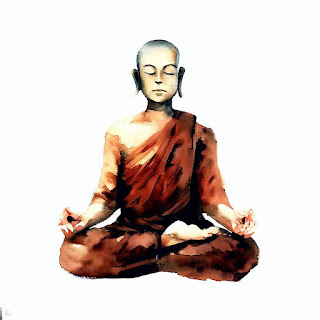In the serene mountains of a distant land, there resided a revered Buddhist monastery, known for its wisdom and discipline. Among the monks, there was one who stood out for his remarkable devotion and dedication to the path of enlightenment - Monk Keshava.
 |
| Monk in Garden |
From a young age, Keshava was drawn to the teachings of Buddha. He was admitted to the monastery at an early age, where he began his arduous journey of learning and practicing the ancient principles. Under the guidance of the venerable Master Shantarakshita, Keshava imbibed the essence of Buddha's teachings, but he struggled with discipline.
While the other monks diligently followed the monastery's strict routines, Keshava often found himself lost in his thoughts, forgetting his duties and responsibilities. Master Shantarakshita patiently observed Keshava's struggle and decided to impart a valuable lesson.
One morning, the Master called Keshava to his chamber. "Keshava," he said gently, "you have immense potential, but without discipline, it remains untapped. To fully realize the path to enlightenment, you must embrace discipline wholeheartedly."
Keshava bowed his head, acknowledging his weakness. "Master, I understand, but discipline has always been a challenge for me."
The wise Master smiled compassionately. "I have devised a special task for you, Keshava. You shall water the Bodhi tree in the monastery garden every day for the next three months."
Keshava was puzzled but agreed to undertake the task diligently. The Bodhi tree, under which Lord Buddha attained enlightenment, was revered, and caring for it was a great honor. Keshava's devotion to the task grew each day, and he began to water the tree with deep reverence and gratitude.
As weeks passed, Keshava noticed something remarkable happening. The more he practiced discipline in caring for the Bodhi tree, the more focused his mind became. He realized that by embracing discipline, he was not only nurturing the tree but also nurturing his own soul.
In the quietude of those moments with the Bodhi tree, Keshava understood the significance of discipline in the pursuit of enlightenment. He saw that discipline was not just about following rules; it was about cultivating self-awareness, inner strength, and harmony.
Three months later, when Keshava's task was complete, he approached Master Shantarakshita with newfound humility. "Master, I am grateful for your guidance. Through discipline, I have experienced a transformation within myself. I now understand its importance on the path to enlightenment."
The Master smiled, his eyes filled with pride. "Keshava, you have learned a valuable lesson. Remember that discipline is not a constraint, but a liberating force. Embrace it with sincerity, and you shall continue to flourish on your journey."
From that day on, Keshava became a living embodiment of discipline in the monastery. His unwavering devotion and commitment to the teachings of Buddha inspired fellow monks to follow suit. The ripple effect of his transformation spread through the monastery, signifying the profound importance of discipline on the path to spiritual awakening.
Read more








